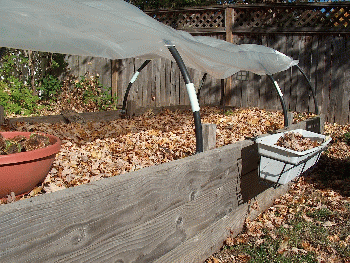why we need due diligence
In 2020, my husband and I got two insulated garden beds and filled them with compost. We've loved watching seeds germinate, giving chard and onions to neighbors, harvesting coriander seeds. With most of our meals including something from our garden, I can't help but feel privileged. I've become nearly missionary about these beds.
Last month, after applying another layer of duct tape to the covers (which insulate the plants through the winter and keep racoons from entering at night), we realized that their polyester fabric--commonly used by growers for frost, heat and insect protection--likely includes PFAs, the forever chemicals. We do not want PFAs in anyone's soil or vegetables.
That's what we've got.
Is every product like this? First comes love, then come unintended consequences that a positive attitude does not erase.
Daily, I learn about unintended consequences of projects that corporate self-regulation and government agencies (like the Environmental Protection Agency, increasingly rendered powerless by Congress and the Supreme Court) fail to protect:
In the 1940s and 1950s, builders turned readily-available tailings from uranium mining into concrete blocks for more than 5000 houses in Grand Junction and Durango, Colorado, and in Utah. The only recourse was to tear down the houses.
Last month, Florida Governor Ron DeSantis cleared the way for the state's roads to be paved with phosphogypsum, a fertilizer byproduct. According to the EPA, phosphogypsum "contains appreciable quantities of uranium and "radium 226, (which) decays to form radon, a cancer-causing, radioactive gas." The Fertilizer Institute insists that roads can be constructed with phosphogypsum without producing "radioactive doses above the EPA's acceptable risks."
When a child gets a smartphone or a laptop, they also get Instagram, Snapchat and/or TikTok; they're daily exposed to sexualized photos, and suicide and eating disorder-related content. Once children have devices, their developing brains become screen-addicted. Realistically, how do today's parents refuse to allow tweens and teens smartphone access? How does anyone limit screen-time? (Consider Dr. Victoria Dunckley's plan to Reset Your Child's Brain with a four-week e-fast.)
While tax breaks abound to support more electric vehicles, charging EVs overheats the nearby transformer--and can shorten its life--typically 30-40 years--to three. Our grid's transformers were designed to cool down at night, not to charge multiple e-vehicles. Two months ago, an LA friend told me that the transformer 50 feet from his house exploded on a Saturday morning--typically, a time of low-demand for electricity. But what happens if multiple EV owners charge on Friday night? Would staggering EV charging times reduce the risk of transformers overheating? If so, should neighborhood EV-owners assign staggered charging times? Who's qualified to answer these questions?
Congress is now fast-tracking American Broadband Deployment Act of 2023. If it passes, H.R. 3557 will allow unrestricted proliferation of cell towers and "small cells" near homes, schools and playgrounds. Telecom facilities will be exempt from local and state regulations, the National Environmental Policy Act and the National Historic Preservation Act. Contact your Congressional representative to stop this bill. Here's the link to House members' phone numbers.
Preventing unintended consequences is much easier than remedying them. For now, before buying vegetables, a car, a phone--or raising a child--consumer-citizens need our own due diligence teams.






